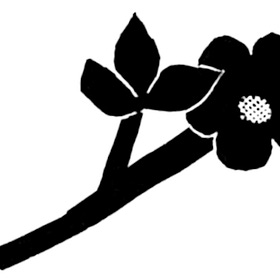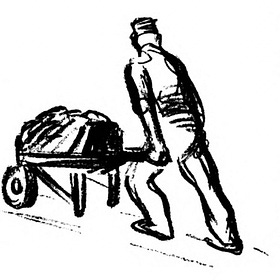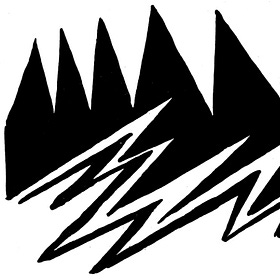—: Dunbar (1920) :— Ah, how poets sing and die! Make one song and heaven takes it: Have one heart and beauty breaks it: Chatterton, Shelly, Keats, and I— Ah, how poets sing and die!
—: I Have A Friend (1927) :— I have a friend And my heart from hence Is closed to friendship, Nor the gods' knees hold but one; He watches with me thru the long night, And when I call he comes, Or when he calls I am there; He does not ask me how beloved Are my husband and children, Nor ever do I require Details of life and love In the grave—his home,— We are such friends.
—: Height (1928) :— When I was young I felt so small And frightened, for the world was tall. And even grasses seemed to me A forest of immensity Until I learned that I could grow, A glance would leave them far below. Spanning a tree's height with my eye, Suddenly I soared as high, And fixing on a star I grew, I pushed my head against the blue! Still, like a singing lark, I find Rapture to leave the grass behind. And sometimes standing in a crowd My lips are cool against a cloud.
—: Earth (p. 1977) :— Earth, I thank you for the pleasure of your language You’ve had a hard time bringing it to me from the ground to grunt thru the noun To all the way feeling seeing smelling touching —awareness I am here!
—: Epitome (p. 1977) :— Once the world was young For I was twenty and very old And you and I knew all the answers What the day was, how the hours would turn One dial was there to see Now the world is old and I am still young For the young knows nothing, nothing.
“Mother Nature, February, forty-five years ago forced me on the stage that I, in turn, might assume the role of lonely child, happy wife, perplexed mother—and, so far, a twice resentful grandmother. I have no academic honors, nor lodge regalia. I am a Christian by intention, a Methodist by inheritance, and a Baptist by marriage. I write about some of the things I love. But have no civilized articulation for the things I hate. I proudly love being a Negro woman—its so involved and interesting. We are the PROBLEM—the great national game of TABOO.” (Spencer, in Caroling Dusk, 1927)
Anne Spencer (1882–1975) was a poet, civil rights activist, feminist, librarian, and avid gardener, from Lynchburg, Virginia; and a significant member of the ‘Harlem Renaissance’, along with fellow poets Langston Hughes, Gwendolyn Bennett, Lewis Alexander, et al. She wrote her first poem in 1896, but did not start publishing until 1920, when her work was featured in prominent black arts and culture magazines The Crisis and Opportunity.
“I wonder why we have not heard more of Spencer. Her art and its expression are true and fine; she blends a delicate mysticism with a diamond clearness of exposition, and her subject matter is original.” (Jessie Fauset, The Crisis, 1922)
“The twenty [or thirty] poems published in her lifetime were invited primarily by black editors and anthologists. Another twenty-odd were gathered from among her papers by J. Lee Greene and published after her death.” (William Drake, The First Wave: Women Poets In America, 1987)
“Spencer and her husband frequently hosted Black travelers in their home, as African Americans were barred from staying at local inns and hotels due to Jim Crow segregation. As a result, their home became a salon for prominent individuals like W. E. B. Du Bois, Langston Hughes, Paul Robeson, and Thurgood Marshall. In 1918, Spencer helped found the Lynchburg chapter of the National Association for the Advancement of Colored People. Writer and activist James Weldon Johnson was also the Spencers’ guest while he helped open the local NAACP chapter… Spencer’s son said of her, ‘My mother was full of fire’.” (Mariana Brandman, Anne Spencer, 2021)
For Anne Spencer by Dick Whyte that i was not and still am oh mother full of fire— you will be remembered
My verse has the basic form of a tanka, or free cinquain, or y’know, whatever you want to call it. A rose is a rose is a rose by any other name, and all that. Before this I wrote two prior stanzas, and I still think it works nicely as a triptych, but there is something about those five lines all on their own. I think it just says it all. But who knows? You might like the long form better? Taste is what it is—singular. Anyway, I thought you might get a kick out of seeing the 10 lines I had to write, in order to get the 5 lines I wanted to write, so here they are;
that i was born and like a tree grown, well loved and watered that i was taught to be kind and to challenge myself and others to be better
Forgotten Poets Presents:
Forgotten Poems, a living anthology of obscure and out-of-print poetry from the late-1800s and early-1900s. Explore the archives:
More African American poetry . . .
Joseph S. Cotter, Jr. - The Mulatto To His Critics (1918)
—: The Mulatto To His Critics :— Ashamed of my race? And of what race am I? I am many in one. Thru my veins there flows the blood Of Red Man, Black Man, Briton, Celt and Scot, In warring clash and tumultuous riot...
Betty Earl - The Shell and the Tear (1922)
—: The Shell and the Tear :— I shaped a poem from a shell; Its fragile curves I loved full well. I shaped another from a tear— A little human sorrow-sphere. The first was formed with matchless grace...
Walt Whitman - 3 Very Short Poems (1860-67)
Walt Whitman isn’t exactly ‘forgotten’, but much of his poetry has been. Today, Whitman is typically remembered for his grandiose, often bombastic, cosmic poems, and his strident, declarative tone. All great stuff! However, he also wrote numerous very short, more intimate poems, seldom discussed or quoted...
Pauline B. Barrington - "I Was A Year In The Trenches" (1917)
I was a year in the trenches Among the tear and spatter Of shrapnel. Among headless men, twisted men, mad men In masses, Under the scream of shells Blossoming overhead Like flowers of flame...
More from the Book of Lost Rhymes . . .
Mary Brent Whiteside - Half Songs (1925)
—: Half Songs :— How little songs that never came to birth, Trouble the earth! Our fingers touch and let them pass; They vanish, whispering through the grass; Sweep like a sigh across a singing pine...















I often have to write my way into poems, too. Those five lines seem to capture Anne Spencer’s essence.
I so look forward to these posts, Dick. Maybe I dream that someone will unearth some of my poems, note when I wrote my first one (because I have no idea), and find new meaning in a new generation. It's a wonderful thing that you do.